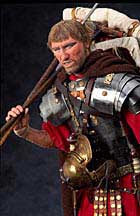 James Russell is a general classicist who specializes in Roman and early Byzantine art and archaeology and Greek and Latin epigraphy of the Roman period.
James Russell is a general classicist who specializes in Roman and early Byzantine art and archaeology and Greek and Latin epigraphy of the Roman period.
He teaches undergraduate courses in Greek and Roman Art (Classical Studies 330), Applied Science and Technology in Classical Antiquity (Classical Studies 306), and courses in Latin and Greek at various levels.
Recent courses taught include Aristophanes (Greek 421), Livy (Latin 411), Latin Comedy (Latin 418), Latin Satire (Latin 419), Virgil (Latin 422).
He regularly teaches graduate seminars in Roman art and archaeology and Latin epigraphy. Recent topics include Official Roman Relief Sculpture, Topography and Monuments of Rome, Roman Funerary Art and Architecture, Roman Architecture in Italy under the Republic, Latin Epigraphy, Roman Archaeology of the Roman Army.
His principal research activity since 1970 has been the direction of the U.B.C. sponsored excavation at Anemurium, a small Roman and Byzantine city on the south coast of Turkey. He is currently working on the final reports of the churches, coins and small finds.
In the course of travel in Asia Minor Russell has discovered a considerable number of inscriptions. Included amongst these are two bronze Roman military diplomas which he has recently published. His current research concerns inscriptions of the Early Byzantine period.
Other areas of research interest are the Roman period in Palestine (Roman bath-house found in the excavation of Capernaum, Galilee), the topography and monuments of Rome, and Roman military activities in Britain north of the Hadrianic limes. Russell is currently Past President of the Archaeological Institute of America.
Recent research includes:
"A Newly Discovered City of Rough Cilicia". The preparation of a report on a recently discovered Roman site on the south coast of Asia Minor. It will consist of a description of the physical ruins still visible on the site; the evidence for its identity, based on ancient itineraries and bishop lists; information on the political, social history and religion of the community from the evidence of Greek inscriptions. "Zeno and Isauria". A study contrasting the extremely unfavorable account of the reign of the emperor Zeno, the Isaurian (A.D. 474-491), as reported by the historians ancient and modern, with the evidence for his generous and beneficent policies that I have assembled from the archaeological and epigraphic record in his native Isauria and other regions of the eastern Mediterranean. "The Archaeological Evidence of Persian Invasions in the Seventh Century". A paper commissioned by the Centre of Byzantine Research of the National Hellenic Research Foundation to be presented at an International Symposium "The Dark Centuries of Byzantium (7th - 9th cent.)" to be held in Athens in May 1999. This will discuss the evidence, or lack of evidence, for the Persian occupation of Byzantine sites throughout the Middle East during the last great conflict between the Byzantine and Persian Empires (A.D. 611-629). "Household Furnishings (Instrumenta Domestica)". An essay commissioned for the catalogue of a special travelling exhibition "Antioch: the Lost Roman City" scheduled for the Worcester Art Museum, the Cleveland Museum of Art and the Walters Art Gallery, Baltimore during 2000-2001. This will cover the material evidence for various aspects of domestic living, such as security, lighting, dining equipment, storage facilities. The evidence will be drawn primarily, but not exclusively, from artefacts found in the excavation of Antioch during the 1930s and now housed in the Princeton University Art Museum.
Contact Information:
Phone: (604) 822-4056
Email: russellj@interchange.ubc.ca
 James Russell is a general classicist who specializes in Roman and early Byzantine art and archaeology and Greek and Latin epigraphy of the Roman period.
James Russell is a general classicist who specializes in Roman and early Byzantine art and archaeology and Greek and Latin epigraphy of the Roman period. 



